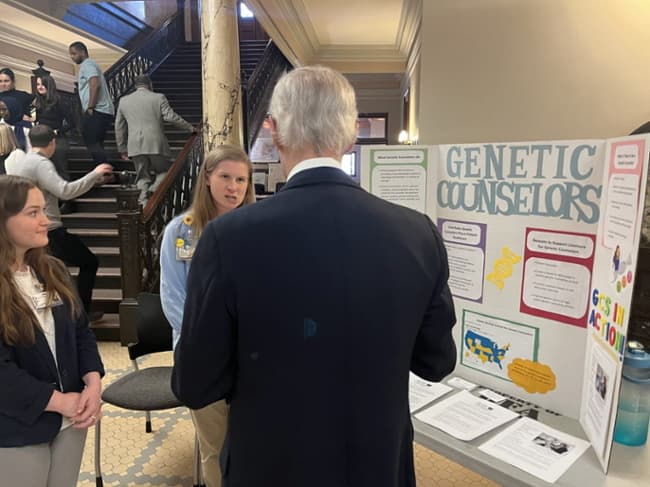Medical Genetics
- Department of Pediatrics Home
- Educational Programs
-
Divisions
- Pediatric Divisions
- Allergy, Asthma and Immunology
- Ambulatory Pediatrics
- Cardiology
- Child Development
- Critical Care
- Emergency Medicine
- Endocrinology
- Forensic Medicine
- Gastroenterology
- General Pediatrics
- Hematology and Oncology
- Infectious Diseases
- Medical Genetics
- Newborn Medicine
- Nephrology
- Neurology
- Palliative Medicine
- Pulmonary
- Rheumatology
- Research
Genetic Counseling Licensure
State Efforts
Licensure for Mississippi Genetic Counselors

Approximately 4 genetic counselors currently live or work in Mississippi. More than 75% of Mississippi’s genetic counselors work full- or part-time in a clinical setting and provide genetic counseling services to patients. Several organizations including the University of Mississippi Medical Center and the Mississippi Department of Health support licensure for genetic counselors. Currently, in the United States, 33 states have licensure for genetic counseling, 2 are in rulemaking, and 12 states (including Mississippi) are making efforts toward licensure.
Who Are Genetic Counselors?
Genetic counselors are healthcare professionals who have a specialized graduate degree, academic training, and experience in both medical genetics and counseling.

What Medical Services do Genetic Counselors Provide?
- Genetic counselors work with physicians, as part of a multidisciplinary team, or independently, to provide genetics services to families and/or individuals.
- Genetic counselors consult with patients and families in reproductive genetics, pediatric genetics, cancer genetics, cardiovascular genetics, neurogenetics, and other genetics settings.
- Genetic counselors provide genetic counseling for patients and families at increased risk for a variety of genetic conditions with onset at birth through adulthood.
- Genetic counselors evaluate and assess risk for a genetic condition, educate patients about the condition and available management options, facilitate genetic testing and test interpretation when available and appropriate, and assess and address the psychosocial impact of a genetic condition in order to help families adapt.
Why Do Genetic Counselors Need to be Licensed?
Mississippi currently has no legal standard to determine who can represent themselves as genetic counselors.
Licensure would protect the citizens of Mississippi by ensuring that genetic counselors practicing in Mississippi:
- Have appropriate training in medical genetics and genetic counseling
- Are certified by the American Board of Genetic Counseling or the American Board of Medical Genetics
- Collect a minimum number of continuing education units to stay up to date in the rapidly changing field of genetics.
Licensure would also create a means for Mississippi to regulate genetic counseling services.
- Mississippi would define what genetic counselors can do
- Mississippi would prevent unqualified individuals from practicing genetic counseling within the state
- Mississippi could suspend or revoke the licenses of genetic counselors who cause harm to citizens of Mississippi through inadequate genetic counseling.

Licensure will positively impact the Mississippi economy:
- Genetic counselors ensure appropriate tests are ordered and interpreted to facilitate proper medical management while reducing healthcare costs
- Licensure would help attract trained genetic counselors to Mississippi
- Licensure would be budget-neutral for Mississippi, as the cost of regulation will be offset by the fees collected for obtaining a license.
Federal Efforts
Support the Access to Genetic Counselor Services Act
Medicare beneficiaries face significant barriers in accessing genetic counseling services as the U.S. Centers for Medicare and Medicaid Services (CMS) do not currently recognize certified genetic counselors (CGC) as healthcare providers. This lack of recognition means CGCs cannot be reimbursed for providing services to Medicare beneficiaries which impedes patients’ access to genetic counseling. Evidence shows that CGCs improve the quality of patients’ healthcare and reduce the costs of genetic services.
For more information on how you can help, such as my messaging your local representative, click here: NSGC > POLICY > Federal Advocacy


